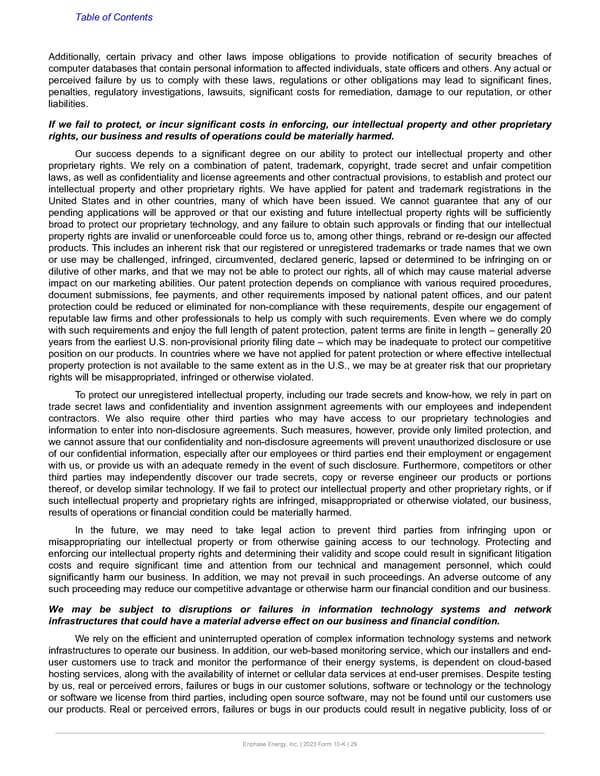Table of Contents Additionally, certain privacy and other laws impose obligations to provide notification of security breaches of computer databases that contain personal information to affected individuals, state officers and others. Any actual or perceived failure by us to comply with these laws, regulations or other obligations may lead to significant fines, penalties, regulatory investigations, lawsuits, significant costs for remediation, damage to our reputation, or other liabilities. If we fail to protect, or incur significant costs in enforcing, our intellectual property and other proprietary rights, our business and results of operations could be materially harmed. Our success depends to a significant degree on our ability to protect our intellectual property and other proprietary rights. We rely on a combination of patent, trademark, copyright, trade secret and unfair competition laws, as well as confidentiality and license agreements and other contractual provisions, to establish and protect our intellectual property and other proprietary rights. We have applied for patent and trademark registrations in the United States and in other countries, many of which have been issued. We cannot guarantee that any of our pending applications will be approved or that our existing and future intellectual property rights will be sufficiently broad to protect our proprietary technology, and any failure to obtain such approvals or finding that our intellectual property rights are invalid or unenforceable could force us to, among other things, rebrand or re-design our affected products. This includes an inherent risk that our registered or unregistered trademarks or trade names that we own or use may be challenged, infringed, circumvented, declared generic, lapsed or determined to be infringing on or dilutive of other marks, and that we may not be able to protect our rights, all of which may cause material adverse impact on our marketing abilities. Our patent protection depends on compliance with various required procedures, document submissions, fee payments, and other requirements imposed by national patent offices, and our patent protection could be reduced or eliminated for non-compliance with these requirements, despite our engagement of reputable law firms and other professionals to help us comply with such requirements. Even where we do comply with such requirements and enjoy the full length of patent protection, patent terms are finite in length – generally 20 years from the earliest U.S. non-provisional priority filing date – which may be inadequate to protect our competitive position on our products. In countries where we have not applied for patent protection or where effective intellectual property protection is not available to the same extent as in the U.S., we may be at greater risk that our proprietary rights will be misappropriated, infringed or otherwise violated. To protect our unregistered intellectual property, including our trade secrets and know-how, we rely in part on trade secret laws and confidentiality and invention assignment agreements with our employees and independent contractors. We also require other third parties who may have access to our proprietary technologies and information to enter into non-disclosure agreements. Such measures, however, provide only limited protection, and we cannot assure that our confidentiality and non-disclosure agreements will prevent unauthorized disclosure or use of our confidential information, especially after our employees or third parties end their employment or engagement with us, or provide us with an adequate remedy in the event of such disclosure. Furthermore, competitors or other third parties may independently discover our trade secrets, copy or reverse engineer our products or portions thereof, or develop similar technology. If we fail to protect our intellectual property and other proprietary rights, or if such intellectual property and proprietary rights are infringed, misappropriated or otherwise violated, our business, results of operations or financial condition could be materially harmed. In the future, we may need to take legal action to prevent third parties from infringing upon or misappropriating our intellectual property or from otherwise gaining access to our technology. Protecting and enforcing our intellectual property rights and determining their validity and scope could result in significant litigation costs and require significant time and attention from our technical and management personnel, which could significantly harm our business. In addition, we may not prevail in such proceedings. An adverse outcome of any such proceeding may reduce our competitive advantage or otherwise harm our financial condition and our business. We may be subject to disruptions or failures in information technology systems and network infrastructures that could have a material adverse effect on our business and financial condition. We rely on the efficient and uninterrupted operation of complex information technology systems and network infrastructures to operate our business. In addition, our web-based monitoring service, which our installers and end- user customers use to track and monitor the performance of their energy systems, is dependent on cloud-based hosting services, along with the availability of internet or cellular data services at end-user premises. Despite testing by us, real or perceived errors, failures or bugs in our customer solutions, software or technology or the technology or software we license from third parties, including open source software, may not be found until our customers use our products. Real or perceived errors, failures or bugs in our products could result in negative publicity, loss of or Enphase Energy, Inc. | 2023 Form 10-K | 29
 Annual Report Page 28 Page 30
Annual Report Page 28 Page 30